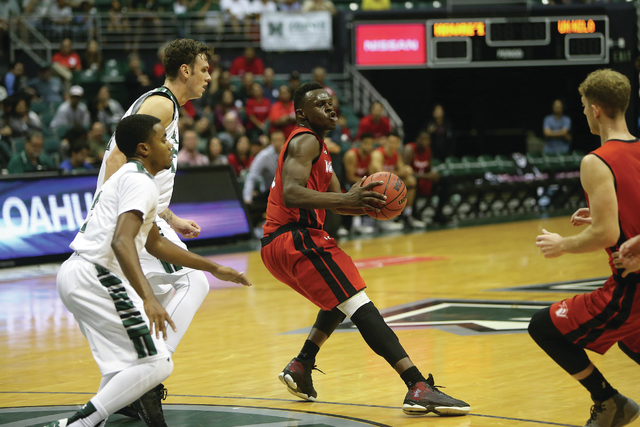When a college basketball coach hits the reset button four games into the season, it usually is not an indication of how well things are going. ADVERTISING When a college basketball coach hits the reset button four games into the
When a college basketball coach hits the reset button four games into the season, it usually is not an indication of how well things are going.
It happened last week for UH-Hilo men’s basketball coach GE Coleman following a disheartening loss in Honolulu to UH-Manoa. It wasn’t so much the score, an 86-55 loss in a game that did not play as close as the score would indicate.
Instead, it was about a sense that his team backed up, sought cover, wasn’t interested in a real battle. Everything went out the window, including the very basics of the offense. The Vulcans made only 18 field goals and just six of those was assisted. UH-Manoa had 24 assists on 31 field goals.
What followed was a few nights of troubled sleep for the coach and a back-to-basics set of practices in which the fundamentals were prioritized all over again.
For as disappointing as the Manoa game was, it wasn’t all bad for Coleman’s team. Being exposed like that is one of the reasons you want to play a Division I team — show us what we need to work on — and the Vulcans got 40 minutes of poor performance to examine and improve upon.
Prior to the game, the Vulcans had just received full medical clearance for Brian Ishola, the 6-foot-6 junior transfer from Division I North Dakota State who had played only two minutes in the first three games after being in a concussion protocol. He’s going to help all season.
Ishola finished with a team-high 18 points, while grabbing six rebounds, a strong effort for the first start of the season, and one that made you wonder if the Vulcans could have scored 30 points without him.
Coleman may have seen the season flash before his eyes, the good potential with a crafty post player like 6-6 Darius Johnson-Wilson, the confidence a team gets from a solid point guard like junior Ryley Callaghan and the needed contributions from a front line player like Ishola, all of it contrasted by disappointing efforts that can erode the confidence and competitiveness of the squad.
There’s work to be done to get this team ready to compete on a regular basis in the Pacific West Conference, but as he goes forward, there will be some solace for the coach with Ishola’s presence on the floor.
“His size and athleticism are going to be keys for us,” Coleman said of the transfer who happens be a high academic achiever, pursuing a major in kinesiology. “This is someone with a very high basketball IQ, he is the best we have probably at going over details of a scouting report, he wants to know exactly the positioning we want on a flare screen, on a back screen, he’s always seeking out details to improve his understanding, to really get his role in the offense.”
In the PacWest, Ishola will be one of those guys who will always be able to get his shot, to exploit a matchup, go grab a rebound and prevent his opponent from getting it. In some sense, he can be a go-to guy, but he won’t be at his best until everyone else contributes.
“When we play selflessly, he is tremendous,” said Johnson-Wilson, “he is that aggressive attacker who can be that force they need to deal with defensively because he is a scoring threat inside and outside.”
For Ishola, the Big Island has been everything he hoped for, transferring from NDSU where winters can be harsh and playing time for him was sparse. Before the season he took a fall off his bicycle and experienced some bad headaches that were determined to be from a concussion. He was cleared and then he took another fall when clipped accidentally by a teammate as Ishola went up for a rebound in practice.
The second concussion comes more quickly after the first concussion and that conjunction worries the training staff. It took Ishola almost a month to fully clear the concussion protocols but now he’s ready for it all to begin, a few games late.
Ishola volunteers his time at Big Island Physical Therapy, working with Alzheimer patients who struggle regaining motor function. A good student, an energetic community volunteer, a confident player who feeds on information all make up for a pretty good teammate.
“I love it here,” he said, “I think I started to feel like I fit in a couple days after I arrived.”
Coleman felt like Ishola fit in about 60 seconds after he saw him in the Vulcans’ gym. He had similar feelings about Callaghan and he knew all about Johnson-Wilson.
How the others grow and develop together after the no-show against UH-Manoa will tell a lot for this team but they won’t get a patsy Wednesday in Honolulu when they play Chaminade, a team taller at every position that played hard and close games against Connecticut and Tennessee in the recent Maui Invitational.
Time to step up, not back, and join the battle with the kinesiology major.



